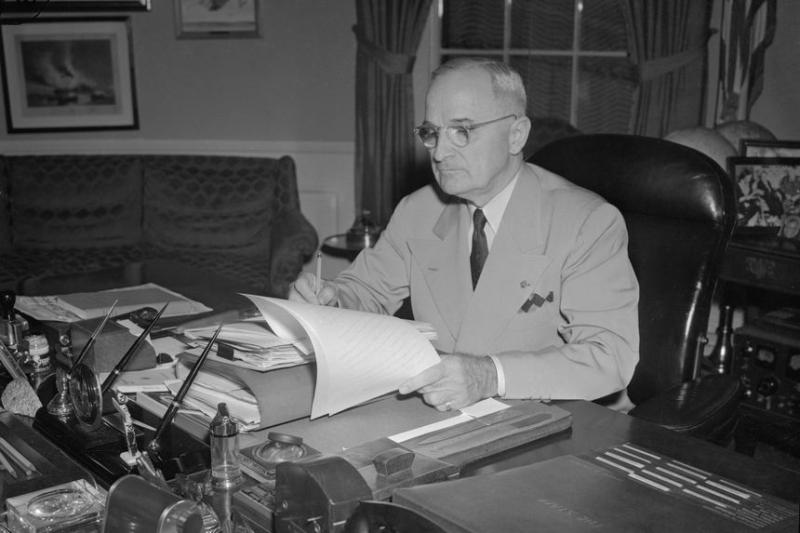'The Trials of Harry S. Truman' Review: Giving Them Hell, Getting It Too
By: Frank Gannon (WSJ)



Harry S. Truman's popularity soared after he suddenly became president in 1945 upon the death of FDR.His reputation was in tatters when he left office in 1953. Indeed, he was reviled by many of the country's leading historians and political observers, who faulted him for (as they saw it) his limited intelligence, weak leadership and complicity in corruption. Then, in 1992, opinion changed. The catalyst for this shift was David McCullough's masterly biography "Truman," which played a major role in transforming our assessment of the 33rd president. Almost overnight, it seemed, Truman became the exemplar of an ordinary man who rises to meet great challenges, a model of tough and courageous decision-making, and a paragon of plain-speaking common sense. His flaws were acknowledged but considered the unfortunate imperfections of a lovable curmudgeon. The erstwhile second-rater was now high on the lists of great presidents.
In "The Trials of Harry S. Truman," Jeffrey Frank attempts a revisionist reappraisal, aiming to scale back the adulation and adjust our perspective. His revisionism is meant to illuminate, not debunk; he believes that amore realistic account of Truman's limits will lead to a deeper appreciation of his greatness. Mr. Frank is an editor and novelist whose most recent book, "Ike and Dick," was an excellent account of the relations between President Eisenhower and his vice president, Richard Nixon.
Mr. Frank’s Truman is “a man with casual prejudices, some that he tried to rid himself of and some that he simply couldn’t.” From an early age, Truman’s speech included words that, even at the time, were considered slurs. “I get along pretty well with the burr heads” was a rationale for continuing to use the n-word. He complained of the Jews that “Jesus Christ couldn’t please them when he was here on earth, so how could anyone expect that I would have any luck?” He could be self-pitying. He confided in a letter that “Mrs. Roosevelt has spent her public life stirring up trouble between whites and blacks—and I’m in the middle.” He frequently made up his own facts—and based snap decisions on them. Regarding an important 1945 press conference announcing a major cabinet shift, Mr. Frank states: “Almost nothing that Truman said that day was true.”
Truman began his political life in Missouri’s Jackson County, dependent on the support of T.J. Pendergast, the corrupt Kansas City Democratic Party boss. Mr. Frank notes that during those years Truman “was considered basically honest, though increasingly indebted to a corrupt political machine.” Corruption became a major issue in Truman’s second presidential term. Mr. Frank deems the bribes directed at administration officials—including cash and mink coats—penny-ante but pervasive. They certainly contributed to the Republican sweep in 1952.
Although some of Truman’s advisers were first-rate, such as George Marshall, Averell Harriman and Dean Acheson, Mr. Frank faults his uncritical reliance on others who were weak or self-interested. He cites in particular Truman’s poker-playing, bourbon-and-branch drinking cronies—people like White House aides Harry Vaughan and Matthew Connelly, and Assistant Attorney General T. Lamar Caudle.
Mr. Frank is especially hard on Clark Clifford, the mellifluous young Missourian who would be a prominent Washington figure through six decades. “Whatever Clifford’s deep beliefs,” Mr. Frank writes, “loyalty to the President wasn’t among them.” He quotes a 1948 letter written when Clifford was still in the president’s inner circle wondering whether Truman was “deserving of four years more.” Mr. Frank sees in Clifford a reputation based on taking credit for other people’s work and ideas.
Although the president endorsed the policy of containing postwar Soviet expansionism, his approach was idiosyncratic. Mr. Frank writes that Truman “was unembarrassed at regarding Stalin as ‘Uncle Joe,’ kin to the roguish politicians he’d known” back in Jackson County. Mr. Frank quotes Truman’s observation that the Soviets were “like people from across the tracks whose manners were very bad.”
As for the implementation of containment, Mr. Frank argues that National Security Council policy paper 68 (NSC-68), delivered to the president in April 1950, was overwrought in its thinking and overheated in its language. Truman, embracing it not wisely but too well, made a number of statements equating a regional conflict between North Korea and South Korea to nothing less than a struggle for the survival of America and the Free World. What followed was a bloody war (roughly 35,000 American dead) whose equivocal conclusion is still a subject of controversy.
There is much that is persuasive in Mr. Frank’s account, and much that is provocative and debatable. Many of Truman’s flaws are shared, to one degree or another, by all political figures, and Truman’s prejudices were of course very much of his time. As Mr. Frank notes, whatever his offensive table talk, the government was desegregated and the military integrated under Truman, and the containment policy, whatever the overreach of NSC-68 or the mistakes of the Korean War, proved successful over time.
The word “trials” in Mr. Frank’s title refers in part to the extraordinary political and geopolitical problems with which Truman had to contend. In part, it refers to day-to-day personal problems and challenges. These ranged from loyalty to undeserving friends to a disapproving mother-in-law. There was also a vexatious media that was dominated by critical columnists like the cerebral Walter Lippmann and the gossip-friendly Drew Pearson.
With a new kind of Cold War heating up and the foibles of our chief executives an ever more intense matter of scrutiny and concern, Mr. Frank’s book is timely in ways he couldn’t have imagined when he started it. While some of his opinions and interpretations—particularly about containment and the Korean War—are unlikely to persuade everyone, his revisionist take on Truman is rigorously researched, thought-provoking and, not least, a pleasure to read.
Mr. Gannon was a White House Fellow and special assistant to President Nixon.



